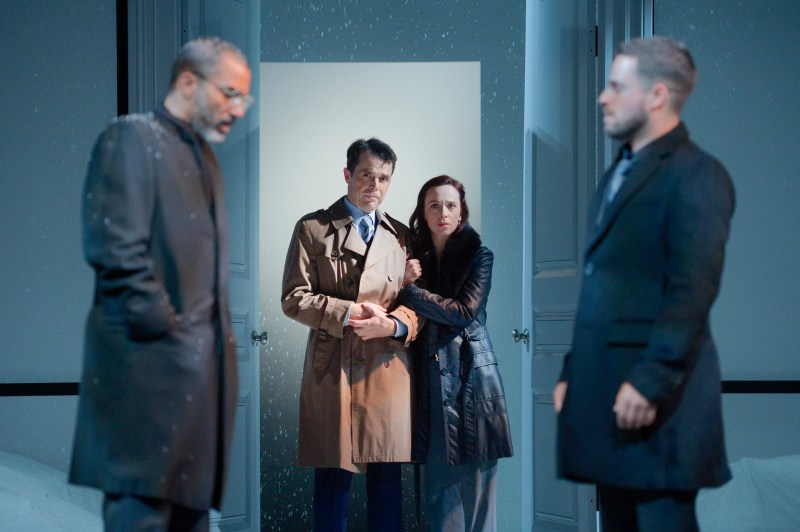The 2017 Tony Award-winning play by J.T. Rogers depicts a fictionalized tale of the story of the Oslo Accords, a 1990s agreement between Israel and the Palestine Liberation Organization. At Marin Theatre Company, “Oslo” is essentially a political drama — the set is built like a government meeting room, with perfectly clean-cut wooden tables and velveteen blue love-seats that yearn for pressed suits and newly-bought dresses to sit upon their oft-groomed surfaces.
Even in the first few minutes, it’s clear that “Oslo” isn’t your ordinary Tony Award-winning play. In fact, it defies expectations of Tony-winning plays — it’s realistic, but it strays just far away from reality and a perfect representation of people existing in reality. Mona Juul (Erica Sullivan), an official in the Norwegian ministry of foreign affairs, narrates the nearly three-hour-long play by breaking out of the world of the play and speaking directly to the audience.
It’s often seen as a theatrical cliché — something that’s overused by amateur playwrights by placing narration directly into the script instead of depicting it onstage. However, I’ll give “Oslo” a pass for this — on two accounts.
First, breaking down the Oslo Accords does require some background. I came into the play with just superficial exposure, and Mona’s explanations of each key player helped immensely. Her narration also serves a secondary (and perhaps more important) purpose of showing her lens into the world. She’s extraordinarily clever and well-respected, and she knows way more than people usually expect from her. Although she’s a diplomat, she’s also the wife of Terje Rød-Larsen (Mark Anderson Phillips), another relatively prominent diplomat and head of a research institute — and thus, she’s constantly overshadowed (at least, in the fictionalized version — I can’t speak for reality). With her help, the audience can understand the complex politics of the “Oslo” world without losing sight of the fast-paced dialogue and narrative.
Second, Rogers pushes this boundary of the fourth wall and steers the audience to see the world through Mona’s eyes. Even though it’s Terje who supposedly “leads” the push towards creating the accords, ultimately it’s Mona’s efforts that make it work. She’s the one that the Israelis and Palestinians want to talk to and entertain; she’s the one who helps Terje out of his anxiety-induced moments of panic. Through her eyes, we can see Oslo how one might see if you were approaching it analytically — even though the play is presented in an “objective” sense, we’re ultimately seeing it the way she sees it — the dimwit men and all. She’s the level-headed one, the smart one, the one who should be making all the decisions — but unfortunately, Marin still doesn’t give her enough credit.
Again, it’s Rogers who pushes for the audience to question how Mona is treated in “Oslo.” Even though it is a play about the Oslo Accords, it’s also (and more importantly) a play about power dynamics — what is said and what isn’t said. The characters push and pull between who to tell important information, who not to tell — when to sneak in a key piece of knowledge and when to withhold it. Mona is perhaps the most effective at this, and this is also why she’s the narrator — Terje is just too self-absorbed, and other characters don’t know enough of the story.
No matter how well-produced, there is still something about “Oslo” that begs some sort of deeper investigation of the script — there’s something about the production that’s missing. It’s pristinely directed by Jasson Minadakis, every set piece beautifully designed by Sean Fanning — but even in the three hours that we all sit in the dark, I craved more. Mona was pushed to her limits but she never truly breaks through — even in the end, she comforts Terje when he realizes that they won’t be honored at the Oslo Accords ceremony even though they facilitated the entire thing in secret. In that moment, I hoped that Terje would recognize Mona, or that some sort of recognition that would pass over her. Instead, she’s left as a symbol of male fragility even in the face of female empowerment and authority that should have left her as a mark of resilience in the world.
Contact Olivia Popp at oliviapopp ‘at’ stanford.edu.
